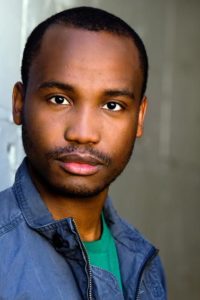
Winner of more than 25 international acting awards and more than 15 writing awards, Donald Molosi is an award-winning Broadway and Hollywood actor and writer. Molosi was the first Motswana actor to perform on Broadway in 2007, and in his upcoming 2017 off-Broadway play “Black Man Samurai,” Molosi chronicles his own decade-long career in New York City’s Theatre District.
Molosi is featured in “A United Kingdom” opposite Golden Globe and Emmy award nominee David Oyelowo and Oscar nominee Rosamund Pike. The film depicts the marriage of Prince Seretse Khama and Ruth Williams in the 1940s and the uniting of the people of Botswana. In his 2017 viral essay “Dear Upright African,” Molosi explores botho as a basis for the African school curriculum. In it, he argues that if African schools included African classrooms it would be an act of botho to those who came before and those who are still to tread the Earth, a proposal embodied in all his theatrical works.
Molosi’s most recent film appearance is in “We Are All Blue,” a documentary film Molosi released in 2017. The film explores Botswana history over the past 50 years through the lens of inter-generational dialogue. In his off-Broadway magnum opus, “Blue, Black and White” (2008), Molosi explored the transformative interracial marriage of Botswana’s inaugural First Couple, Sir Seretse and Lady Khama.
Molosi holds an MA in Theatre and Performance Studies from the University of California–Santa Barbara, a Graduate Diploma in Classical Acting from LAMDA (UK) and a BA in Political Science and a BA in Theater, both from Williams College in Massachusetts.
Grace Amponsah is a MasterCard foundation scholar and recent graduate of Ashesi University College with a major in Business Administration. She is passionate about youth development, women empowerment and entrepreneurship. She is a member of the Dalai Lama fellows and Byron fellows community whose purpose is to create a flourishing world by building compassionate, resilient and visionary leaders around the world. She is the founder of “A New Dawn,” an organization whose sole purpose is to unleash the potential of underprivileged teenage girls by maximizing their educational, financial, social and spiritual life. Amponsah is presently a faculty intern for Foundations of Design and Entrepreneurship at Ashesi University College.
Pumla Gobodo-Madikizela is Professor and Research Chair for Historical Trauma and Transformation at Stellenbosch University. Her work focuses mainly on two strands of research: exploring intergenerational repercussions of oppression and institutional violence, and exploring what she terms “reparative humanism” which builds on her earlier work on the relationship between remorse and forgiveness after historical trauma. She loves coastal walks and is a patron of the theatre as well as of opera and listens to jazz at home.
Anthony King, PhD, Assistant Professor of Psychiatry at University of Michigan Medical School, and faculty associate of Institute for Social Research (ISR) and Trauma, Stress, and Anxiety Research Group, is a clinical psychologist and translational neuroscience researcher, whose research focuses on neuroimaging (fMRI), genomic, and epigenetic effects of trauma exposure, and psychotherapeutic interventions for Posttraumatic Stress Disorder (PTSD), including Contemplative practices. He is lead author of a clinical trial of MBCT for PTSD, and co-PI of a 5-year federally-funded research program to develop a Mindfulness- and Compassion-based therapy for PTSD in military veterans (Iraq & Afghanistan), and test its clinical and neurobiological effects using fMRI brain imaging.

